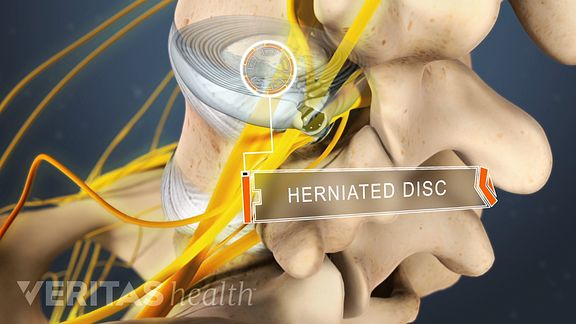Back Pain Caused by a Pinched Nerve or Degenerated Disc?
This is an Excellent review By Louis Chang, MD
Visit www.theosteopath.net for further information or email appointments@theosteopath.net
When back pain is caused by a spinal disc problem, the source of the pain is either from a nerve being irritated by a protruding disc, or from the disc itself. Differentiating between the two can cause confusion, as doctors may use a variety of terms to describe the problem, such as a slipped disc, protruding disc, pinched nerve, and/or degenerated disc.

A herniated disc can irritate nerves and cause pain, or pain may be in the disc space itself.
Watch Herniated Disc Video
Read on to learn more about what essentially happens when you have a pinched nerve or a disc problem.
Pinched nerve pain
When a spinal disc causes mechanical compression, irritation, or inflammation of a nearby nerve root, it’s not the disc that hurts—it is nerve pain due to intrusion by the disc. Pain from a pinched nerve root in your lower back can radiate along the path of the nerve into your leg and foot. Neurological problems, such as numbness, weakness, tingling, and/or a pins-and-needles sensation may also occur.
This type of pain is medically termed as radiculopathy. When radiculopathy occurs due to the irritation or compression of specific nerve roots in the lower back (L4 to S3), it is commonly referred to as sciatica.
Pinched nerves can be caused by:
- Herniated discs
- Spinal stenosis
- Bone spurs that occur as a result of osteoarthritis.
While less common, a pinched nerve may also be caused by other conditions, such as a tumor, infection, or spondylolisthesis.advertisement
Degenerated disc pain
If the source of your back pain is the intervertebral disc, it is called discogenic back pain. A spinal disc may degenerate due to wear and tear or trauma and cause pain by the following mechanisms:
- Inflammation. As the disc degenerates, inflammatory proteins may be released into the disc space. A degenerated disc may also herniate, causing its inner inflammatory contents to leak out. These inflammatory agents may irritate or inflame nearby nerves, causing pain.1–3 Herniated discs can also cause pinched nerve pain as described above.
- Shrinkage. Degeneration may cause dehydration within the disc, resulting in loss of fluid content and shrinkage. The degree of disc shrinkage can cause narrowing of the spinal canal, leading to radiculopathy.
- Motion segment instability. Disc degeneration can also cause the spinal segment to become unstable and not be as effective in resisting the motion in the spine.1
As the body attempts to counteract the inflammation, instability, and pain, the muscles in the area may spasm, which can cause sharp, shooting pain, worsening the back pain. Pain from a degenerated disc may be localized or may radiate into your leg (radiculopathy).
See Causes of Degenerative Disc Disease Pain
Focus on the cause of your pain
By focusing on the underlying cause of your pain, as opposed to only symptom relief, you will have the best chance of finding an appropriate treatment plan for long term relief. An Osteopath can conduct relevant clinical and diagnostic tests to confirm the exact cause of your pain and formulate an accurate treatment plan.